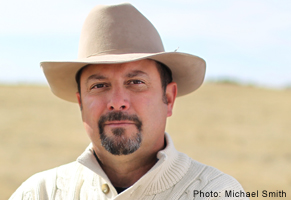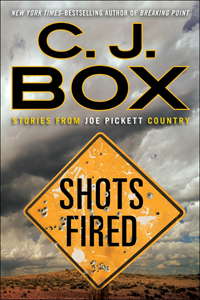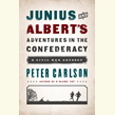Crime and Punishment in the Wyoming Wilderness
C.J. Box, author of the Joe Pickett novels, explores evil and vengeance in a new story collection
Fans of C.J. Box’s Joe Pickett novels—fourteen bare-knuckled mysteries set in the wilds of the author’s native Wyoming—will be pleased to open Shots Fired, his first collection of short fiction. For readers unfamiliar with Box, this new book is a fair introduction to the unforgiving physical world his characters inhabit, as well as to their preoccupation with irredeemable evil. The ten tales gathered here include four that feature Joe Pickett, the intrepid game warden with a knack for unearthing crime plots and confronting violent bad guys. In the other six stories, Box experiments with different time periods and narrative forms, though all of them contain elements of the author’s characteristic tough-guy attitude. Reading Box’s novels is like sitting ringside at a twelve-round heavyweight bout; reading his stories is like witnessing a back-alley mugging.
 As the book’s subtitle, Stories from Joe Pickett Country, makes clear, Box knows his audience’s expectations, and he never disappoints. The formula for his popularity involves mixing crime with bad weather and exotic animals, adding desperate individuals who hatch extra-legal schemes for escaping their fates, and finishing it all off with a blast of fatal violence. Even when a story begins with a comic premise, it takes a dark turn halfway through, and then the bodies begin to accumulate. In “Le Sauvage Noble” (“The Noble Savage,” as Box helpfully translates in parentheses), for example, Jimmy Two Bulls, a contemporary Lakota Indian, travels to France to perform in a Wild West show for Disneyland Paris; in his spare time he services the sexual needs of fetishistic French women. When he impregnates the wife of a Paris gangster, however, the story quickly turns into one of deadly intrigue and merciless revenge.
As the book’s subtitle, Stories from Joe Pickett Country, makes clear, Box knows his audience’s expectations, and he never disappoints. The formula for his popularity involves mixing crime with bad weather and exotic animals, adding desperate individuals who hatch extra-legal schemes for escaping their fates, and finishing it all off with a blast of fatal violence. Even when a story begins with a comic premise, it takes a dark turn halfway through, and then the bodies begin to accumulate. In “Le Sauvage Noble” (“The Noble Savage,” as Box helpfully translates in parentheses), for example, Jimmy Two Bulls, a contemporary Lakota Indian, travels to France to perform in a Wild West show for Disneyland Paris; in his spare time he services the sexual needs of fetishistic French women. When he impregnates the wife of a Paris gangster, however, the story quickly turns into one of deadly intrigue and merciless revenge.
A similar reversal occurs in “The End of Jim and Ezra,” Box’s foray into historical fiction. Set in 1835, the story describes a pair of beaver trappers who venture into uncharted northern Wyoming and get snowbound by an early blizzard. They have adequate shelter and food to survive the brutal winter, but their uncomfortably close co-habitation makes Jim feel murderously claustrophobic. Rather than spend another day in Ezra’s uncouth company, he attempts the long trek back to civilization on foot but discovers too late that the obstacles in his path—head-high snow drifts and the well-armed Pawnee—are exponentially worse than Ezra’s most irksome eccentricities.
 Most of Box’s stories are set in contemporary Wyoming, which provides local hoodlums with criminal opportunities unique to the region. In “The Master Falconer,” a Saudi aristocrat tries to coerce a native-bird specialist into smuggling peregrine falcons. And “The Pirates of Yellowstone” hinges on the smuggling of microorganisms from the national park’s “hot spots and geysers.” As a waitress at a local tavern explains, “Our government is studying some of them legitimately, trying to find out if they could be a cure for cancer, or maybe a bioweapon, or whatever. It’s illegal to take them out of the park. But the rumor is there are some people stealing the microbes and selling them. You know, bio pirates.”
Most of Box’s stories are set in contemporary Wyoming, which provides local hoodlums with criminal opportunities unique to the region. In “The Master Falconer,” a Saudi aristocrat tries to coerce a native-bird specialist into smuggling peregrine falcons. And “The Pirates of Yellowstone” hinges on the smuggling of microorganisms from the national park’s “hot spots and geysers.” As a waitress at a local tavern explains, “Our government is studying some of them legitimately, trying to find out if they could be a cure for cancer, or maybe a bioweapon, or whatever. It’s illegal to take them out of the park. But the rumor is there are some people stealing the microbes and selling them. You know, bio pirates.”
Box seems to reserve his strongest judgment for wrong-doers among the one-percenters. In the opening story, “One-Car Bridge,” absentee landowner Lamar Dietrich commands his ranch foremen to follow an absurdly detailed Book of Rules and fires them for the slightest infractions. Dietrich—clearly identified as the villain with his “overlarge gargoyle-like head, swinging jowls, and a large, sharp nose”—meets a Western brand of justice delivered by the aggrieved teenage son of one of his victims. Box disposes of other rich interlopers with equivalent disdain. In “Dull Knife,” a trust-fund creep apes Native American values while luring young Indian women into drug addiction. Living in Wyoming is hard enough, Box seems to be saying, without outsiders exploiting its resources and people for their own contemptible purposes.
To combat injustice or to thwart evil, Box’s protagonists often resort to savage violence. When Nate Romanowski discovers that someone has entered his bird coop without permission, his logic is crisp and uncontestable: the open door to the mews indicates that “his falcons had been disturbed or were gone. Which meant that somebody was going to get hurt.” His revenge employs his knowledge of the Native American sun-dance pole, an excruciating purification ritual for which he offers no apologies: “It’s not so bad,” he deadpans. “I did it once myself. But when he gets cut down, he’ll be a warrior.”
This brand of unrepentant masculine ferocity pervades Shots Fired. The collection as a whole conveys the necessity of meeting violence with greater violence and embraces a primitive ideal of manhood. When the cuckolded husband in “Every Day is a Good Day on the River” carries out a plot to murder his wife’s lover, nothing in the story suggests that what he is doing is wrong or even unusual. All that matters is that one man is strong enough to take action, and another is too weak to stop him.
These tales will inspire some readers to pack up their fly-fishing gear and hunting rifles and head to Wyoming. Others will be content to remain in their civilized enclaves, far from C.J. Box’s wilderness of depraved criminals and sudden retribution.

Sean Kinch grew up in Austin and attended Stanford University as an undergraduate. He later earned a Ph.D. in modern fiction from the University of Texas at Austin. He now teaches English at Montgomery Bell Academy in Nashville.


